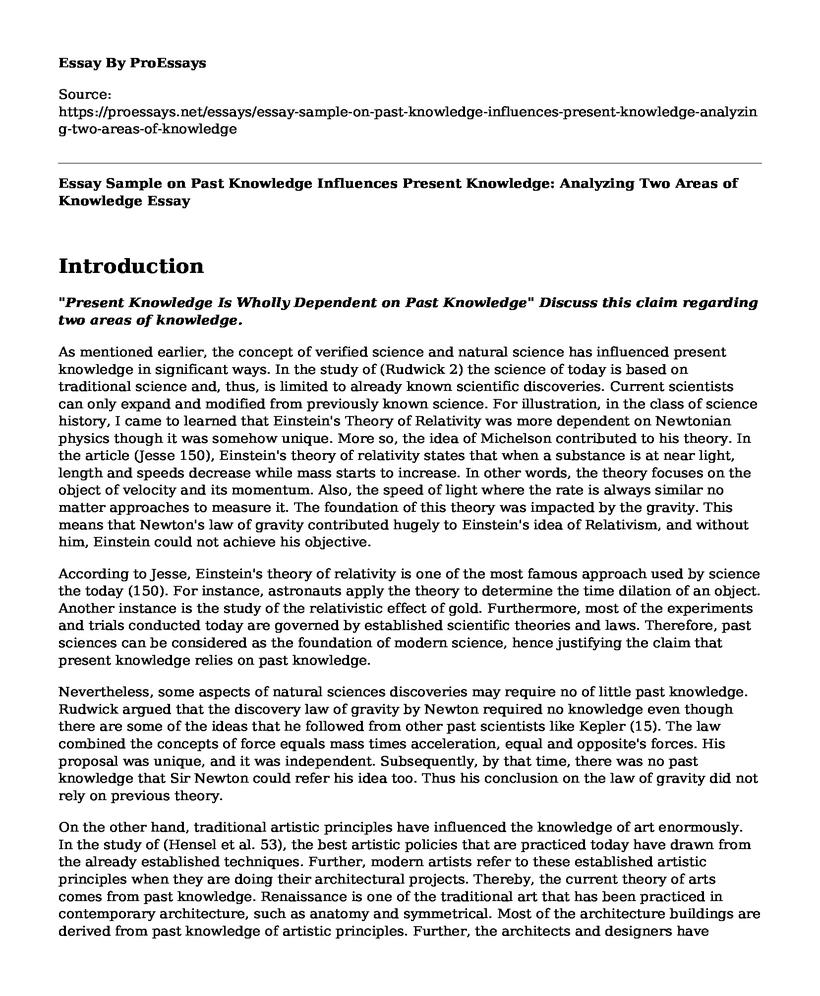Introduction
"Present Knowledge Is Wholly Dependent on Past Knowledge" Discuss this claim regarding two areas of knowledge.
As mentioned earlier, the concept of verified science and natural science has influenced present knowledge in significant ways. In the study of (Rudwick 2) the science of today is based on traditional science and, thus, is limited to already known scientific discoveries. Current scientists can only expand and modified from previously known science. For illustration, in the class of science history, I came to learned that Einstein's Theory of Relativity was more dependent on Newtonian physics though it was somehow unique. More so, the idea of Michelson contributed to his theory. In the article (Jesse 150), Einstein's theory of relativity states that when a substance is at near light, length and speeds decrease while mass starts to increase. In other words, the theory focuses on the object of velocity and its momentum. Also, the speed of light where the rate is always similar no matter approaches to measure it. The foundation of this theory was impacted by the gravity. This means that Newton's law of gravity contributed hugely to Einstein's idea of Relativism, and without him, Einstein could not achieve his objective.
According to Jesse, Einstein's theory of relativity is one of the most famous approach used by science the today (150). For instance, astronauts apply the theory to determine the time dilation of an object. Another instance is the study of the relativistic effect of gold. Furthermore, most of the experiments and trials conducted today are governed by established scientific theories and laws. Therefore, past sciences can be considered as the foundation of modern science, hence justifying the claim that present knowledge relies on past knowledge.
Nevertheless, some aspects of natural sciences discoveries may require no of little past knowledge. Rudwick argued that the discovery law of gravity by Newton required no knowledge even though there are some of the ideas that he followed from other past scientists like Kepler (15). The law combined the concepts of force equals mass times acceleration, equal and opposite's forces. His proposal was unique, and it was independent. Subsequently, by that time, there was no past knowledge that Sir Newton could refer his idea too. Thus his conclusion on the law of gravity did not rely on previous theory.
On the other hand, traditional artistic principles have influenced the knowledge of art enormously. In the study of (Hensel et al. 53), the best artistic policies that are practiced today have drawn from the already established techniques. Further, modern artists refer to these established artistic principles when they are doing their architectural projects. Thereby, the current theory of arts comes from past knowledge. Renaissance is one of the traditional art that has been practiced in contemporary architecture, such as anatomy and symmetrical. Most of the architecture buildings are derived from past knowledge of artistic principles. Further, the architects and designers have acquired their skills and knowledge from past theories. Indeed, past knowledge has influenced the growth of the arts.
On the contrary, there some of the present knowledge in arts that go against the century established artistic principles. This has influenced some of the artists not follow the rules and guidelines that were amended basing on past knowledge of architecture. A good instance is the cubist art movement that was led by Pablo Picasso. In the book of (O'Brien 155), cubist art never follows any perspective in the art that was there since the renaissance. Subsequently, the art of abstract was design without the established artistic principles. In other words, it was completely independent of the theory of the past.
Conclusion
In conclusion, the above essay has proven present knowledge is entirely dependent on past knowledge. Modern history, arts, sciences are dependent on past historical narrative, artistic principles, and natural sciences. For instance, the best artistic principles that are practiced today have drawn from the already established arts. Also, current scientists are expanding and modifying past science. This was justified by Einstein's Theory of Relativity. Einstein utilized Newton's Law of gravity to generate his theory of Relativity. Therefore, contemporary artists, scientist and historians should be focused on past knowledge before existing knowledge. However, the past theory has misguided the present knowledge in one way or the other. The above essay has illustrated why whites are more powerful compared to Africans. In that perspective therefore, past of knowledge may be disregarded in the modification of the current theory. Although there are some instances that contemporary knowledge contrast with experience, it is rational to conclude that present knowledge is limited to previous theory. Hence, the present knowledge cannot exist without past knowledge.
Works Cited
Norbert, Elias, "Power/Knowledge | Social Theory Rewired." Routledgesoc.Com, 2018, pp. 203-242, http://routledgesoc.com/category/profile-tags/powerknowledge.
Hensel, Michael, and Christian Hermansen Cordua. "Past and Present Trajectories of Experimental Architectures." Architectural Design, vol 85, no. 2, 2015, pp. 16-23. Wiley, doi:10.1002/ad.1871.
Rudwick, M. "The Great Devonian Controversy." Math.Chalmers.Se, 2017, pp. 2-15 http://www.math.chalmers.se/~ulfp/Review/devon.pdf.
Jesse, E. "8 Ways You Can See Einstein's Theory of Relativity in Real Life". Livescience.Com, 2018, pp. 75-155, https://www.livescience.com/58245-theory-of-relativity-in-real-life.html.
O'Brien, Dan. "Art and Philosophy". Oaji.Net, 2020, pp. 155 http://oaji.net/articles/2019/6934-1553761885.pdf.
Cite this page
Essay Sample on Past Knowledge Influences Present Knowledge: Analyzing Two Areas of Knowledge. (2023, Mar 27). Retrieved from https://proessays.net/essays/essay-sample-on-past-knowledge-influences-present-knowledge-analyzing-two-areas-of-knowledge
If you are the original author of this essay and no longer wish to have it published on the ProEssays website, please click below to request its removal:
- Digital Media Ethics and Technology on Climate Change Essay
- The American Dream Essay Example
- Ethics and Critical Thinking: The Stanford Prison Experiment
- Paper Example on TechFite: Promoting Leadership & Community Involvement
- Free Paper on Desire in Philosophy: Enhancing Cognition & Action Dispositions
- Unraveling Ethical Concerns: Examining Damon Investment Company's 21% Return Claim - Free Paper
- Essay Sample on Types of Procrastination







